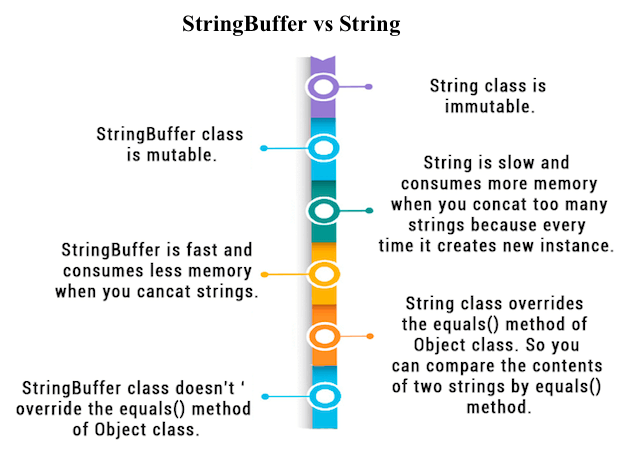📌 相关文章
- Java stringbuffer和stringbuilder之间的差异
- Java stringbuffer和stringbuilder之间的差异(1)
- Java StringBuffer类(1)
- Java中的StringBuffer类
- Java中的StringBuffer类
- Java中的StringBuffer类(1)
- Java StringBuffer类
- Java中 String 和 StringBuffer 对象的 equals()
- Java中 String 和 StringBuffer 对象的 equals()(1)
- 在Java中对 String 和 StringBuffer 的集合进行排序
- int 和 string 之间的差异 (1)
- stringbuffer javascript (1)
- x++ 和 ++x 之间的 java 差异 - Java (1)
- stringbuffer javascript 代码示例
- 使用 stringbuffer 输入 - Java (1)
- x++ 和 ++x 之间的 java 差异 - Java 代码示例
- int 和 string 之间的差异 - 无论代码示例
- 使用 stringbuffer 输入 - Java 代码示例
- 后向链与前向链之间的差异
- 后向链与前向链之间的差异(1)
- Java.lang.StringBuffer类
- Java 对象与类之间的差异
- Java 对象与类之间的差异(1)
- Java中的StringBuffer insert()(1)
- Java中的StringBuffer insert()
- Java程序清除StringBuffer(1)
- Java程序清除StringBuffer
- Java中的 StringBuffer toString() 方法及示例(1)
- Java中的 StringBuffer toString() 方法及示例
📜 Java string和stringBuffer之间的差异
📅 最后修改于: 2020-09-25 14:56:44 🧑 作者: Mango
String和StringBuffer之间的区别
String和StringBuffer之间有许多区别。下面列出了String和StringBuffer之间的差异:
| No. | String | StringBuffer |
|---|---|---|
| 1) | String class is immutable. | StringBuffer class is mutable. |
| 2) | String is slow and consumes more memory when you concat too many strings because every time it creates new instance. | StringBuffer is fast and consumes less memory when you cancat strings. |
| 3) | String class overrides the equals() method of Object class. So you can compare the contents of two strings by equals() method. | StringBuffer class doesn’t override the equals() method of Object class. |

String和StringBuffer的性能测试
public class ConcatTest{
public static String concatWithString() {
String t = "Java";
for (int i=0; i<10000; i++){
t = t + "Tpoint";
}
return t;
}
public static String concatWithStringBuffer(){
StringBuffer sb = new StringBuffer("Java");
for (int i=0; i<10000; i++){
sb.append("Tpoint");
}
return sb.toString();
}
public static void main(String[] args){
long startTime = System.currentTimeMillis();
concatWithString();
System.out.println("Time taken by Concating with String: "+(System.currentTimeMillis()-startTime)+"ms");
startTime = System.currentTimeMillis();
concatWithStringBuffer();
System.out.println("Time taken by Concating with StringBuffer: "+(System.currentTimeMillis()-startTime)+"ms");
}
}
String和StringBuffer HashCode测试
正如您在下面给出的程序中看到的那样,当您连接字符串时,String返回新的哈希码值,但是StringBuffer返回相同的值。
public class InstanceTest{
public static void main(String args[]){
System.out.println("Hashcode test of String:");
String str="java";
System.out.println(str.hashCode());
str=str+"tpoint";
System.out.println(str.hashCode());
System.out.println("Hashcode test of StringBuffer:");
StringBuffer sb=new StringBuffer("java");
System.out.println(sb.hashCode());
sb.append("tpoint");
System.out.println(sb.hashCode());
}
}